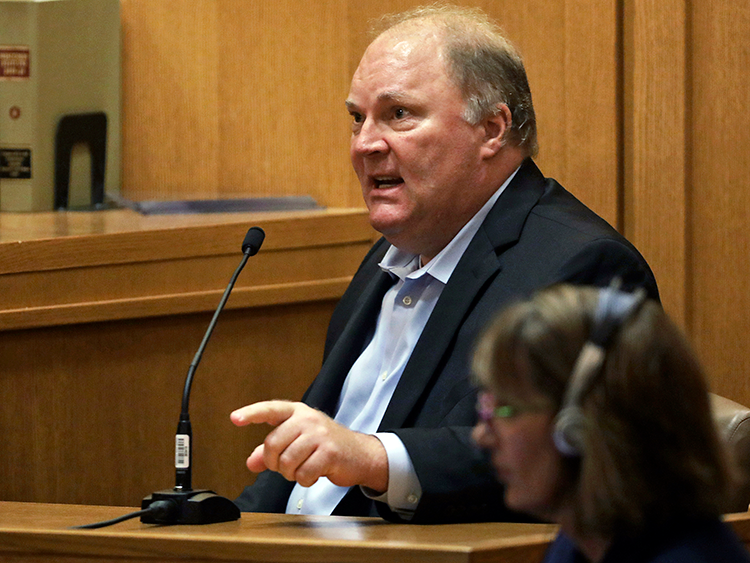Limiting the ability of a defendant to consult with counsel during a trial for murder
RELIST WATCH
That brings us to the upcoming conference. The conference on Friday will include 96 motions and petitions. Villarreal v. Texas is the only one on its first relist. At noon, his direct examination was interrupted by a long overnight recess. In an instruction that could be described as “not very clear,” the trial judge instructed defense counsel to continue to act as if Villarreal was still “on standby” and not to discuss his testimony with him overnight. The judge made a series offhand remarks suggesting that counsel could still discuss sentencing and trial logistic, but not Villarreal’s testimony. Villareal’s lawyer objected to the instruction, claiming that it interfered with Villarreal’s right of consultation with his attorney. The next day, Villarreal finished testifying, was convicted, and drew a 60-year sentence.
Villarreal’s case implicates two aging Supreme Court criminal procedure precedents. Geders v. United States held that a court’s refusal to allow the defendant to speak with his attorney during a nighttime break between direct and cross examination violated the Sixth Amendment. But Perry v. Leeke, 13 years later, held that a trial court does not violate the Sixth Amendment by prohibiting the defendant from consulting his counsel during a fifteen-minute recess between his direct testimony and cross-examination.
By a 2-1 vote, the court of appeals affirmed Villarreal’s conviction, though noting confusion among the lower courts on the subject. Texas’s highest criminal appeals court, the Texas Court of Criminal Appeals affirmed Villarreal’s conviction by a divided vote. It concluded that by placing off limits only discussion of the defendant’s ongoing testimony, the trial court had complied with the Sixth Amendment.
Villarreal now seeks review, asking the court for further guidance about the universe of circumstances not covered by Geders and Perry. Texas opposes review on the ground that, “
hile there is a split of authority concerning such orders,” orders restricting a defendant’s conferring with counsel during substantial recesses “are rarely issued.” The state argues that the decision in Villarreal’s case comports with the Supreme Court’s Sixth Amendment precedents.
On the one hand, it has been a long, long time since the Supreme Court last weighed in on this issue: Most readers would consider me an old man, I have been practicing for over 30 years, and I didn’t even begin law school until the year after Perry was decided. The current court system is not interested in weighing-in on constitutional issues relating to trial practice. I would be happy to eat crow on this. I would be happy to eat crow on this.
New Relists
Villarreal v. Texas, 24-557
Issue
: Whether a trial court abridges a defendant’s Sixth Amendment right to counsel by prohibiting the defendant and his counsel from discussing the defendant’s testimony during an overnight recess.
Returning Relists[w]Apache Stronghold v. United States, 24-291
Issue
: Whether the government “substantially burdens” religious exercise under the Religious Freedom Restoration Act, or must satisfy heightened scrutiny under the free exercise clause of the First Amendment, when it singles out a sacred site for complete physical destruction, ending specific religious rituals forever.
(Relisted after the Dec. 6, Dec. 13, Jan. 10, Jan. 17, Jan. 24, Feb. 21, Feb. 28, Mar. 7, Mar. The conferences are on March 21, Mar. 28, and Mar. 28 conferences. )
Ocean State Tactical, LLC v. Rhode Island, 24-131Issues:
(1) Whether a retrospective and confiscatory ban on the possession of ammunition-feeding devices that are in common use violates the Second Amendment; and (2) whether a law dispossessing citizens without compensation of property that they lawfully acquired and long possessed without incident violates the takings clause of the Fifth Amendment.
(Relisted after the Jan. 10, Jan. 17, Jan. 24, Feb. 21, Feb. 28, Mar. 7, Mar. The conferences are on March 21, Mar. 28, and Mar. 28 conferences. )
Snope v. Brown, 24-203Issue:
Whether the Constitution permits Maryland to ban semiautomatic rifles that are in common use for lawful purposes, including the most popular rifle in America.
(Relisted after the Jan. 10, Jan. 17, Jan. 24, Feb. 21, Feb. 28, Mar. 7, Mar. The conferences on March 21 and 28 are also scheduled. 28 conferences.)
L.M. v. Town of Middleborough, Massachusetts, 24-410Issue
: Whether school officials may presume substantial disruption or a violation of the rights of others from a student’s silent, passive, and untargeted ideological speech simply because that speech relates to matters of personal identity, even when the speech responds to the school’s opposing views, actions, or policies.
(Relisted after the Feb. 21, Feb. 28, Mar. 7, Mar. The conferences are on March 21, Mar. 28, and March 28. 28 conferences. )
Neilly v. Michigan, 24-395Issue
: Whether restitution ordered as part of a criminal sentence is punishment for purposes of the Constitution’s ex post facto clause.
(Relisted after the Feb. 28, Mar. 7, Mar. The conferences are on March 21, Mar. 28, and Mar. 28 conferences. )
Ellingburg v. United States, 24-482Issue
: Whether criminal restitution under the Mandatory Victim Restitution Act is penal for purposes of the Constitution’s ex post facto clause.
(Relisted after the Feb. 28, Mar. 7, Mar. The conferences are on March 21, Mar. 28, and Mar. 28 conferences. )






